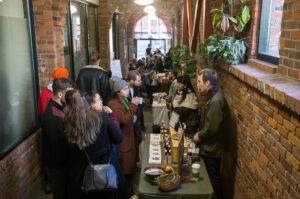Returning for its 10th anniversary, the Victoria Tea Festival, presented by the International Tea Appreciation Society, is the place to be if you drink tea, but also if you’re interested in the history of tea within different cultures. In addition to the farmer’s-market-style affair, where you bring your own cup and taste dozens of teas from over 30 tea-makers, the festival has other attractions. There’s an educational symposium, a rare and antique tea ware gallery, live music and food, and the World Tea Championship, where people showcase their skills in competitive tea-making (yes, that’s a real thing).
The tea festival prides itself on a close-knit, local experience, says festival president Jared Nyberg. Rather than just being a series of vendors, these tea makers are about educating and achieving an intimate relationship with tea producers.

“We have a tea market, and most of the people that are there have a direct connection to the producers, so it’s not just repackaged product from some people on the east coast,” Nyberg says. “These are people that are actually intimately and directly connected to the farmers who are producing the product.”
The festival will feature a traditional Japanese tea ceremony, as well as a demonstration on how to press tea cakes. Another feature of the show is a rare and antique teaware gallery, where some fascinating tea artefacts will be on display, such as a teapot recovered from a shipwreck 400 years ago. Patrons will also witness the intricacies of competitive gongfu tea making. Nyberg says that this method of making tea is a skilled art form with many layers of characteristics.
“I think most people would agree that it’s a large amount of tea in a very tiny vessel,” he says. “You do a very fast infusion, and it’s multi-layered.”
Nyberg says the judges are not just looking for flavour and technique, but also culturally significant practices like the way the tea makers move, and the quality of qi that they infuse into the tea. Tea is much more than the idea of putting a tea bag in hot water and drinking whatever comes out after four minutes, as in English tea culture, says Nyberg.
“There are purveyors and teas that will change your entire concept of what tea is, and you get to meet people with decades of experience,” he says. “These aren’t just vendors. When you go to a festival, normally, you’re getting drinks or food, it’s a very two-dimensional exchange. This is a knowledge exchange.”
There is also a tea symposium featuring guest speakers. Patrons will learn from experts on Japanese tea traditions, rooibos processing, the art of kintsugi, growing your own tea, and more. According to Nyberg, the show is more than just tea, it’s a learning experience, where a viewer is immersed in culture and education.
“You’re coming here because you’re going to come away with something deeper than just a new tea,” he says. “You’re going to come away with a perspective on making tea that may have changed or shifted. You’re going to come away from this having learned a lot, and getting really excited about it.”
The Victoria Tea Festival
11 am to 5 pm Saturday, October 4
$15-$25 suggested donation; bring your own tea cup
Nootka Court, 633 Courtney Street
victeafestrevival.org
